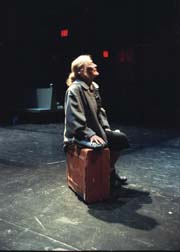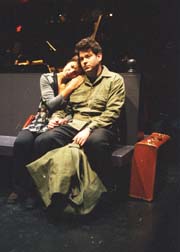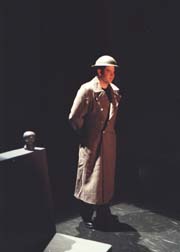
Passages and Crossings
"In Transit" by Denise Bonal is atmospheric, wise and breathtakingly staged.

| |
| The luminous Jacqueline Bertrand in "In Transit." Photo: Jonathan Slaff | |
November 9 to 26, La MaMa E.T.C. (Annex Theater), 74A East Fourth Street
Presented by La MaMa E.T.C. (Ellen Stewart, Founder/Artistic Director) and
Ubu Repertory Theater (Françoise Kourilsky, Founder/Artistic Director)
Th-Sat at 8:00 pm, Sun at 3:30 pm and 8:00 pm
Fri & Sat $20/tdf; Th & Sun $15/tdf
Box office (212) 475-7710
Reviewed by Rosette C. Lamont November 11, 2000
"All the world's a stage," and LaMaMa's Annex Theatre allows for a great
number of possible configurations. Francoise Kourilsky, the imaginative,
passionately involved director of her bi-lingual company, the UBU
Repertory, has a firm grasp on the protean space erected to present the
premiere of Denise Bonal's "In Transit." The Annex is both long and high.
Since the action of the play is supposed to take place in a train station with its high waiting room, appropriately called in French la salle des pas perdus (the room of lost steps), Kourilsky placed two rows of facing chairs along the length of the hall. The bleachers where the audience usually sits, high above the floor, is at present occupied by Genji Ito's musical ensemble (accordion, violin, guitar, and bass).
The play in fact opens with the female accordionist walking in slowly, and making her way through the room, playing her red and gold instrument. The mood is set at once, filling us with a strange nostalgia. The itinerant musician, and her companions evoke a Belle Époque France, the France of heart-rending Piaf, or of merry Charles Trenet.

| |
| "We, the onlookers, follow with concern, or even tender pity the coming and going of lost creatures: husbands and wives who part, perhaps for awhile, perhaps forever." | |

| |
| WWI remembrances haunt "In Transit." | |
There are no minor roles in this production. Often two or three groups are formed on different parts of the floor. I admired Michel Moinot's Cezanne-like card playing on the ground with his buddies. They happened to have nested at my feet, and I observed their composure, the joy they seemed to take in companionship. Moinot knows how to take a small scene and turn it into a vignette. He is a true artist.
And now two scenes that transcend realism, taking the play into a dream world: Simon Fortin's interpretation of "the man who wants to know more about his deceased mother." The Mother figure appears wrapped in cloud-like veils; she is the bride mother, perhaps also the young man's future bride. She is the ultimate bride "sans merci Death. She is a riddle, a danger, unwinding a long, white winding sheet. And then there is Genevieve Schartner's evocation of millions of the Dead: The Little Yellow Lights." Bonal's play opens the furnaces of the Holocaust. [Lamont]

| home |
reviews |
cue-to-cue |
discounts |
welcome |
| museums |
NYTW mail |
recordings |
coupons |
publications |
classified |